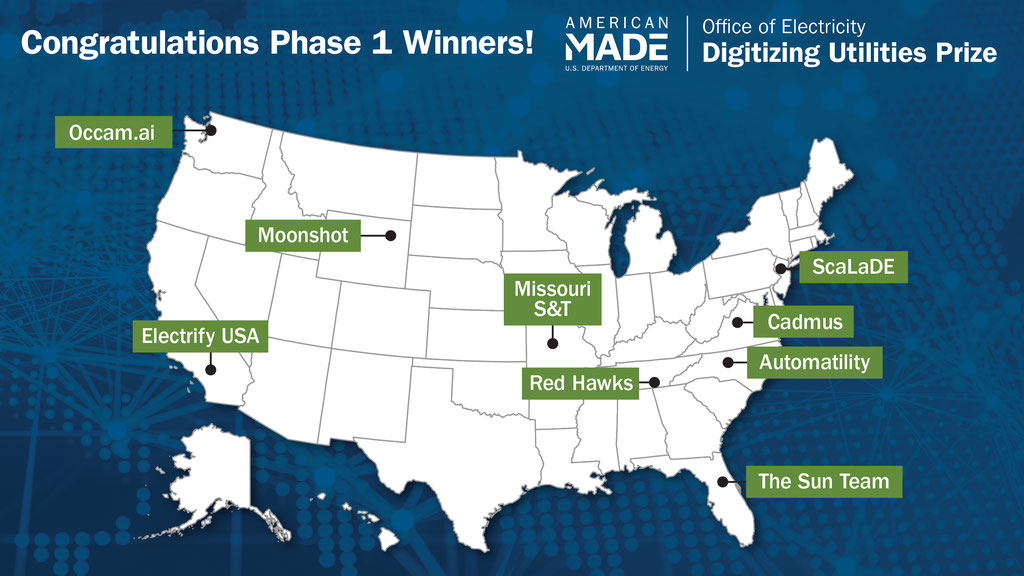The U.S. Department of Energy’s (DOE's) Office of Electricity (OE) today announced the nine Phase 1 winners of the inaugural American-Made Digitizing Utilities Prize. This $675,000 prize – $75,000 for each team – connects utilities with interdisciplinary teams of software developers and data experts to transform digital systems in the energy sector through data analytics, processing, quality assurance, storage, and deletion.
“The electric industry sector is facing a massive amount of data from various sources, challenging traditional methods of data acquisition, use, and storage,” said Gene Rodrigues, Assistant Secretary for Electricity. “There is an emerging need to quickly process large data sets to improve reliability and resilience of the electric grid and meet new demands from the integration of renewable energy.”
Phase 1 of the Digitizing Utilities Prize invited developers to solve predetermined utility challenges. Competitors worked on utility partner challenges within one of three tracks to propose software solutions that improve how the energy industry manages, stores, and processes data. Judges selected three teams from each track — nine in total — to receive a $75,000 cash prize and advance to Phase 2 of the competition where they will have the opportunity to work directly with the partner utilities.

Track 1 – Load Modeling
Competitors worked with Bonneville Power Administration to use load modeling to help correctly forecast future power demands, specifically addressing the dynamic nature of weather-sensitive loads for residential and commercial buildings. The Track 1 winners are:
- Load Forecast Using Autoencoder and Regression (Rolla, MO) – Missouri University of Science and Technology and Grid Vision Technologies aims to estimate load composition and forecast load-using machine learning and regression methods.
- The Data Wave of the Future (Arlington, VA) – This team will use machine-learning modeling techniques to provide insights into the distribution network to characterize weather-sensitive loads. This team will use a distributed computing platform to run the models and develop workflows to process and organize the data.
- Occam.ai (Seattle, WA) – This team provides analytics and highly configurable scenario-based forecasts using a unified, easy-to-use interface. It will allow users to upload location-specific historical data, analyze the current system, design future scenarios, and share results with other planners and stakeholders.
Track 2 – Data Analysis Automation
Competitors worked with Dominion Energy to propose methods for the automation of data analysis to help engineers scrutinize and evaluate a data-driven approach to resolving nuanced complexities across the system. The Track 2 winners are:
- Toward Real-Time High-Sampling-Rate Monitoring (Chattanooga, TN) – This team is developing data analytics functions using phasor measurement unit and point-on-wave data for asset diagnostics and performance evaluation systems.
- Automatility (Cary, NC) – This team is developing a modular, platform-agnostic systems integrator focused on utility needs for data integrity, transformation, visualization, historical analysis, and alarm thresholding.
- ScaLaDE – Scalable Labeling for Data Enrichment (Princeton, NJ) – This team uses machine learning to enrich large datasets with event labels by incorporating domain knowledge from power system experts.
Track 3 – Competitor-Identified Challenge
Competitors with an existing utility partner identified their own digitization or data challenge and proposed solutions. The Track 3 winners are:
- Expedite Integration of EV in Distribution System (Riverside, CA) – This team is developing an integrated and data-driven planning platform that predicts feeder-level EV adoption, forecasts charging profiles and analyzes impacts on the distribution network.
- Digitizing Distribution System Model Validation (Orlando, FL) – This partnership between the University of Central Florida and Duke Energy Corporation is developing a system to identify the root causes of model mismatch by combining domain knowledge with first principles and data analytics.
- Leverage AMI Data with ML to Mitigate Wildfires (Gillette, WY) – This team will use machine learning to review voltage and load interval data from smart meters to detect physical connection issues to mitigate wildfires.
In Phase 2 of the Digitizing Utilities Prize, these Phase 1 winning teams will have six months to work with utility partners to implement their proposal and demonstrate how other utilities in the future could use their software solution. Up to four winners of Phase 2 will receive a portion of the $425,000 total cash prize pool.

